- Home
- Marilynne Robinson
Housekeeping: A Novel Page 11
Housekeeping: A Novel Read online
Page 11
And yet as I approached the house I was newly aware of the changes that had overtaken it. The lawn was knee high, an oily, dank green, and the wind sent ripples across it. It had swamped the smaller bushes and the walk and the first step of the front porch and had risen to the height of the foundation. And it seemed that if the house were not to founder, it must soon begin to float.
When Lucille came home she was carrying a bag in which there was a dress pattern with four yards of cream-and-brown-checked wool. She explained that what seemed to me to be a dress was in fact a skirt and a small jacket. The jacket, she explained, could be worn open with a blouse or with a brown or cream skirt. The skirt could be worn with a blouse or sweater. When she had finished this outfit, she would make a brown skirt and get a sweater to match it. “It will all be coordinated,” she said. “It will go with my hair.” She was deeply serious. “You have to help me. The instructions tell how to do it.” We cleared away the clutter on the kitchen table, which was considerable. Sylvie had taken lately to keeping tin cans. She washed the labels off with soap and hot water. There were now many of these cans on the counters and the windowsill, and they would have covered the table long since if Lucille and I had not removed them now and then. We did not object to them, despite the nuisance, because they looked very bright and sound and orderly, especially since Sylvie arranged them open end down, except for the ones she used to store peach pits and the keys from sardine and coffee cans. Frankly, we had come to the point where we could hardly object to order in any form, though we hoped that her interest in bottles was a temporary aberration.
We spread the big tan sheet of instructions out on the table. Lucille knelt on a chair and leaned across the table to read step 1. “We’ll need a dictionary,” she said, so I went to get one from the bookcase in the living room. It was old, one of my grandfather’s books. We had never used it before.
“The first thing to do,” Lucille said, “is spread out the cloth. Then you pin on all the pieces of the pattern, and then you cut them out. Look up pinking shears.” I opened to P. At that place there were five dried pansies—one yellow, one blue-black, one mahogany, one violet, one parchment. They were flat and stiff and dry—as rigid as butterfly wings, but much more fragile. At Q I found a sprig of Queen Anne’s lace, which was smashed flat and looked very like dill. At R I found a variety of roses—red roses, which had warped the page on each side a little to their shape, and pink wild roses.
“What are you doing?” Lucille asked.
“This dictionary is full of pressed flowers,” I said.
“Grandpa.”
“He put lady’s slippers under O. Probably orchids.”
“Let me see that,” Lucille said. She took the book by each end of its spine and shook it. Scores of flowers and petals fell and drifted from between the pages. Lucille kept shaking until nothing more came, and then she handed the dictionary back to me. “Pinking shears,” she said.
“What will we do with these flowers?”
“Put them in the stove.”
“Why do that?”
“What are they good for?” This was not a real question, of course. Lucille lowered her coppery brows and peered at me boldly, as if to say, It is no crime to harden my heart against pansies that have smothered in darkness for forty years. “Why won’t you help me with my dress? You just don’t want to help.”
“I’ll get another book to put them in.”
Lucille scooped up flowers and crushed them between her palms. I tried very hard to hit her with the dictionary, but she blocked it with her left elbow, and then slapped me very deftly on the left ear. I dropped the dictionary on the floor. I was furious, of course, and determined to land a blow, but somehow she fended off every one with her bony forearms, and still managed to punch me in the ribs. “All right,” I said, “I won’t help.” And I walked out of the kitchen and up the stairs.
She yelled, “You were never going to! Never!” I was amazed at her passion. I sat down on my bed with a book open, so that if she came up to rage at me more I could pretend to be reading. In a minute she stamped upstairs and stood outside the closed door. “You were just looking for an excuse not to help, and you found it! Very nice! Thanks a lot!” she yelled, and went downstairs. A few minutes later she came up again and shouted, “I can do it myself, you know! You’re no help, anyway. All you ever do is just stand around like some stupid zombie!”
There was a good deal of truth in all this. I considered my uselessness exculpatory, in fact, though I wanted to make some more dignified defense, especially since I owed Lucille two blows. But that would come later. “I can’t hear you, Lucille,” I called sweetly. “You’ll have to speak louder.”
“Oh, right,” she said. “Very funny. Really clever,” and these were the last words she spoke to me for several days. Even Sylvie noticed. “What’s gotten into you girls?” she would say. Lucille would slip out of the house, and never tell me where she was going, and she smiled with a smug delight if, just to offer conversation, I asked her where she had been. I was pretty sure that she was with the older girls we had seen at the drugstore, or with someone else who would be useful to her in the same way. Once, I noticed that she was gone from the house, and I ran out to the road. There she was, two blocks away, walking toward town. The road was deep in dust as fine as atoms, and the sun was very hot. I started running to bring myself closer to her, but she looked back and saw me and she began to run, too. I decided I would tell her that Sylvie wanted something from a store, since she was going downtown anyway. That would save me from the embarrassment of appearing to chase her. But Lucille did not stop. I ran and ran, until the stitch in my side was intolerable, and then I walked, thinking I could wave to her to stop and wait if she ever looked around, but she did not.
The flying dust made a film of mud on my skin and my sweat-soaked shirt. Lucille’s, too, I thought. She will not go around all covered with dirt. She will be home. I went back to wait, savoring in anticipation a meager and minor victory, but she did not come back until the evening. Then only her face and hands were clean, her forearms and her throat and shirt were filthy. So she had spent one of those days of waiting for the day to pass, reading old magazines in the toolshed, or skipping rocks at the shore, all to avoid me.
I felt that Lucille’s wrath was prolonged by the fact that she spent several hours each day working on her dress. No doubt it reminded her constantly of our quarrel, and no doubt I seemed in some part to blame for every frustration she encountered. She worked in isolation in the spare bedroom, where my grandmother’s sewing machine was stored. It was a small, primitive electric. It smelled like hot rubber and axle grease, and it ran with a sound like num-num-num. Num num num. num. num. Lucille had taped a sign on the door that said, in letters of unctuous neatness and clarity, DO NOT DISTURB. It was often very quiet in that room. One day I was standing in the hall, listening to the machine and thinking that the dress might be going well enough to make a few words possible, when Lucille sang out, “Don’t come in, Ruthie.” For many days there was no sign that the dress would ever be done, or the hostilities ended. But one day I was sitting in the kitchen eating a sandwich and reading a book when Lucille came downstairs with her dress bundled up in her arms and stuffed it into the stove. She bunched a newspaper and pushed it in, and dropped a lighted match on it. The kitchen began to smell like smoldering hair.
Lucille sat down across from me. “I didn’t even bother to take the pins out,” she said.
“I’m really sorry.”
“Oh, it’s not your fault. You wouldn’t have been any help anyway.”
“I’m worse at those things than you are,” I agreed.
“Much,” she said.
This seemed to be something less than reconciliation.
“I’m not mad any more,” Lucille said.
“Neither am I,” I replied.
“I know you can’t help the way you are.”
I thought about that. “I know that you can’t
help the way you are, either,” I said.
Lucille looked at me evenly. “I don’t have to,” she said. “I’m not like that.”
“Like what?”
“Like Sylvie.”
You are, too. Neither am I. Both replies seemed wrong. Lucille had a point. I suppressed an impulse to slap her, though. I knew that when she was herself trying to be so mature, a slap would catch her entirely by surprise.
I said, “I think it’s pretty strange to make such a fuss over a few pressed flowers.”
“It wasn’t the flowers, Ruthie.”
That sounded rehearsed. I waited, knowing that she would go on.
“It was much more than that. We’ve spent too much time together. We need other friends.”
Lucille peered at me. When she had made a decision or a choice, I had little to say. She knew my side of things as well as I did. She would have considered already the fact that I had never made a friend in my life. Until recently, neither had she. We had really never had any use for friends or conventional amusements. We had spent our lives watching and listening with the constant sharp attention of children lost in the dark. It seemed that we were bewilderingly lost in a landscape that, with any light at all, would be wholly familiar. What to make of sounds and shapes, and where to put our feet. So little fell upon our senses, and all of that was suspect. One evening we were walking past the door of Sylvie’s room that opened into the orchard, and we saw her brushing her hair in front of the mirror. She was sitting on the seat, with the little lamp turned on. She would brush her hair all to one side, and put down the brush and look at herself. Then she would brush it straight back, and roll it and pin it at the nape, and look at herself. All this was startling in Sylvie, who seemed to give no thought to her looks at all. My mother, Helen, had hardly shown more interest in how she looked than Sylvie herself, and yet the night before she brought us to Fingerbone she had spent the evening just that way, brushing her hair before the mirror, changing and changing, and calmly appraising each change. What was to be made of this? Nothing at all. Why should two estranged sisters think the same thoughts before their mirrors? And how do we know what Helen’s thoughts were? It might not have been until she was on her way to Fingerbone that she decided what she would do, though it was in Seattle that she bought the graham crackers that were to help us wait.
It was meaningless or indecipherable, a coincidence, but Lucille and I watched her a long time. Her head fell to the side so oddly and awkwardly when she reached to fasten up the hair at her neck, as my mother’s had done. That was not mysterious. They were both long and narrow women like me, and nerves like theirs walk my legs and gesture my hands. Was this coincidence just another proof of the conspiracy of the senses with the world? Appearance paints itself on bright and sliding surfaces, for example, memory and dream. Sylvie’s head falls to the side and we see the blades of my mother’s shoulders and the round bones at the top of her spine. Helen is the woman in the mirror, the woman in the dream, the woman remembered, the woman in the water, and her nerves guide the blind fingers that touch into place all the falling strands of Sylvie’s hair.
So Lucille and I noticed things that seemed familiar to us, and possibly meaningful, and sometimes we talked about them and often we did not. But that day she leaned across the table and said, “I can’t wait till I’m old enough to leave this place!”
“This house?”
“This town! I think I’ll go to Boston.”
“No, you won’t.”
“You’ll see.”
“Why Boston?”
“Because it isn’t Fingerbone, that’s why!”
Every morning in August Lucille in her nightgown touched her toes by our open window, because she had read somewhere that good health is a form of beauty. She brushed her red hair a hundred strokes, till it crackled and flew after the brush. She groomed her nails. This was all in preparation for school, since Lucille was determined now to make something of herself. And with what rigor, what hard purpose, she threw herself down in the grass with Ivanhoe and The Light That Failed and Wuthering Heights and Little Men and National Geographic and anything else she took to be improving. She would lie in the shade, propped on her elbows, reading, and if I said, “When you’re tired of that let’s go to the lake,” she replied, “Go away, Ruthie.” Sometimes I brought out a book, too, and sat down in the grass, but her concentration distracted me and I would do something juvenile, like pelting her book with clovers and twigs, or laughing out loud at anything I found to be slightly amusing in my book. She would sigh and get up and walk into the house. If I followed her she would say, “I’ll lock myself in the bathroom if I have to, Ruthie,” in a voice of patient scorn. At this same time she began to keep a diary in a big blue loose-leaf notebook which she tied around with a yellow ribbon so that it would seem less like an ordinary notebook. She left it lying on the bureau, and once I read it. I reasoned that it contained only the things that in better times she would have told to me. But I found instead lists of exercises she had done and pages she had read. She had copied from somewhere a table grace, which had an aristocratic sound, being brief and crisp and not excessively reverent. Beneath it she had printed in large letters, PASS TO THE LEFT, REMOVE FROM THE RIGHT. If I hoped to find anything of the old Lucille, I obviously would not find it here. But the very day I looked into the diary it disappeared from the bureau. I suppose there was something particular about the way the bow had been tied, for Lucille had grown that chary of her privacy. When it disappeared I imagined that Lucille might have begun to write down her thoughts in it, and I even began to imagine what they might be. She would surely note somewhere in it that I was more the image of Sylvie with every day that passed, because she had remarked to me once or twice that it was odd to spend as much time as I did looking out of windows, and that it was odd to tie back one’s hair with grocery string.
If I had been keeping a diary at that time—Lucille’s diary made me think now and then how my days would appear, entered like hers in a notebook—I would have perhaps recorded the discovery of a tattered twenty-dollar bill fastened with a safety pin to the underside of Sylvie’s left lapel. This did not disturb me much. It had probably always been there. Nevertheless, it was a reminder of her transient’s shifts and habits which distracted my attention from Lucille. It was now obvious that Lucille would soon be gone. She was intent upon it. I watched her constantly—here was the mystery again, and this time slowed, dilated. Every day she prepared to leave—with what care!—and someday she would leave.
On the first day of school she slipped out of the house early and left without me. I could see her walking alone, far ahead of me, in her bright white oxfords and her crisp white blouse, her hair a yellowy copper in the sunlight. Well, I thought, she is alone, too. About an hour after school began, a girl brought a note to my classroom asking me to come to the principal’s office. I met Lucille in the hall, and we walked down to the office without a word. The principal was named Mr. French. He made us sit down in front of his desk, and then he sat down on a corner of the desk and swung his leg and toyed with a bit of chalk. His skull was small and smooth, and his hands were the size of a boy’s and very white. He would watch the chalk in his hands and look up at us from under his eyebrows. This mannerism of his was intended, I think, to suggest a temperate yet mysterious authority, though he softened this effect somewhat by wearing loud socks.
He said, “You girls missed half a year of school last year. What are we going to do about that?”
“Give us extra homework,” Lucille said. “We can catch up.”
“Well,” he said. “You’re bright girls. You’ll be all right if you make the effort. What we really have to hope for here,” he said, measuring his words, “is a change of attitude.”
Lucille replied, “My attitude has changed.”
He looked from one to the other of us, sidelong. “So you don’t need to hear my little sermon, Lucille?”
“No, I don’t,” she said.
“And what about you, Ruth?”
“No. I mean, I guess not.”
“You guess not.”
My face was very hot. Mr. French was not an unkind man, but he took an inquisitor’s delight in unanswerable questions. He tossed his chalk and watched me sharply.
“She knows what you’re going to say,” Lucille said. “I don’t know if she’ll work harder this year or not. She will or she won’t. You can’t really talk to her about practical things. They don’t matter to her.”
“She’s growing up,” Mr. French said. “Education should matter. What does matter to you, Ruth?”
I shrugged. Mr. French shrugged, mocking me. “That’s what I mean,” he said, “by a problem of attitude.”
“She hasn’t figured out what matters to her yet. She likes trees. Maybe she’ll be a botanist or something.”
Mr. French eyed me doubtfully. “Are you going to be a botanist, Ruthie?”
I said, “I don’t think so.”
Mr. French sighed and stood up and put down his chalk. “You’re going to have to learn to speak for yourself, and think for yourself, that’s for sure.”
Lucille looked steadily at my face. “She has her own ways,” she said quietly.
That was the only time Lucille and I spent together at school. I saw her often, but she avoided me. She became one of a group of girls who ate lunch in the Home Economics room. I ate lunch wherever I could find enough space to seat myself without appearing to wish to insinuate myself into a group, or a conversation, and I read while I ate. Lunches were terrible. I could scarcely swallow. It seemed as if I were trying to eat a peanut-butter sandwich while hanging by the neck. It was a relief to go to Latin class, where I had a familiar place in a human group, alphabetically assigned. Schoolwork itself became a sort of refuge, and I became neat and scrupulous, though sometimes I would sweat with the urge to run home and see if the house was empty. When I could fix my thoughts again on a hypotenuse, I was relieved and even happy. Mr. French, after a month or two, called me to his office to tell me he was glad to hear that my attitude had in fact changed. He had a thick stack of my neat and perfect papers lying on the corner of his desk. I knew nothing then, and I know nothing now, of the mechanics of such things as attitudes, and if it pleased him to say that I had one, and that it had changed, I would not argue. But the fact was that I preferred Latin to lunch, and to daydreaming, and I was afraid to go down to the lake alone that autumn.

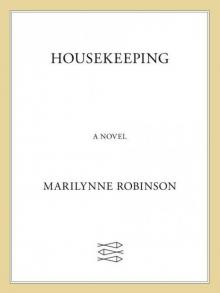 Housekeeping: A Novel
Housekeeping: A Novel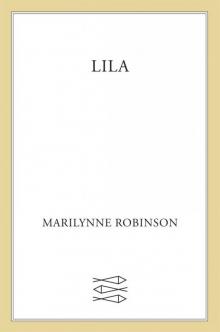 Lila
Lila Mother Country: Britain, the Welfare State, and Nuclear Pollution
Mother Country: Britain, the Welfare State, and Nuclear Pollution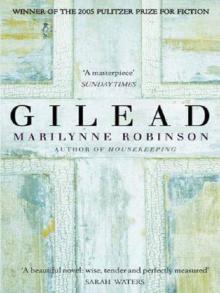 Gilead
Gilead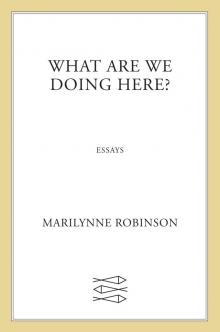 What Are We Doing Here?
What Are We Doing Here? Home
Home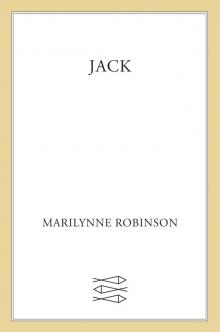 Jack
Jack Mother Country
Mother Country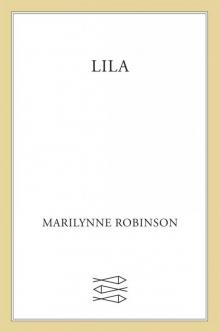 Lila: A Novel
Lila: A Novel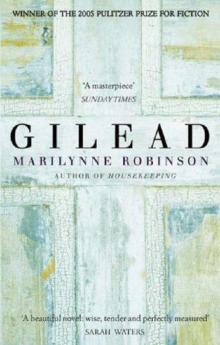 Gilead (2005 Pulitzer Prize)
Gilead (2005 Pulitzer Prize)